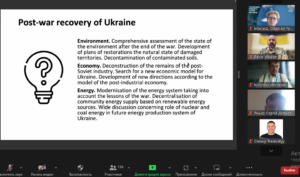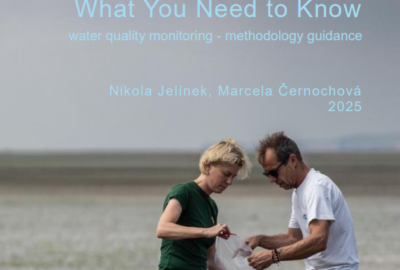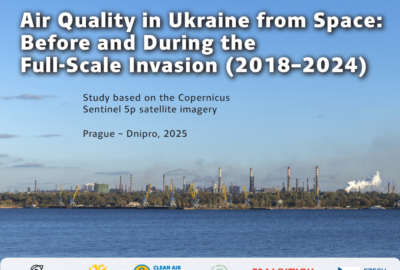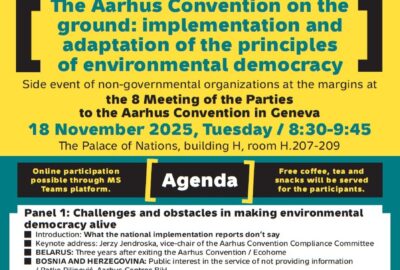On 21st March 2023, an international online conference was hosted under the auspices of ARNIKA. “The Environmental Consequences of the Russian War in Ukraine: together for the future recovery of the Ukrainian Environment” the conference brought together Czech and Ukrainian ecologists together with Government officials to discuss how to restore the environment following the cessation of hostilities.
Once hostilities have ceased, it is important that Russia, (through any negotiated peace settlement), is held financially accountable in the form of war reparations/compensation for the damage caused to towns, cities, countryside, and infrastructure of Ukraine, by its illegal and unwarranted military action.
In addition to the towns, cities, countryside and infrastructure, the huge damage caused to the environment of Ukraine must not be over-looked when assessing the costs to be included within any reparations/compensation.
We now present the output and details of the conference “The Environmental Consequences of the Russian War in Ukraine: together for the future recovery of the Ukrainian Environment” .
Recovery from war is not without precedent in Europe. Following the cessation of hostilities after the Second World War, Europe was faced with long-term problems of land pollution and urban reconstruction. Countries like Germany, the Czech Republic, and Poland have gone down the path of recovery, and the learnings end experiences gleaned from their recovery will prove to be useful for Ukraine in the future.
The war, in Ukraine, the first armed conflict on the European mainland for decades, has resulted in a worsening of the ecological situation across Europe. Cross-border consequences of the war and in particular its impact on the environment, is of considerable concern to a number of experts from different countries. In the Czech Republic, the position of Commissioner for the Recovery of Ukraine has been created, and the Czech Republic will assist the Dnipropetrovsk region in its reconstruction. This was reported by Jakub Lewandowski, a representative of the Embassy of the Czech Republic.
KEY HIGHLIGHTS OF THE CONFERENCE
The event was attended by representatives of the Ministry of Environment of the Czech Republic, representatives of the Czech Embassy in Ukraine, as well as Embassies of other European countries, representatives of the Ministry of Foreign Affairs of the Czech Republic, ecologists and scientists from Ukraine and various European countries who work on the topic of assessing the impact of military actions on the environment.
Specialists presented the international experience of overcoming and recovering from the damage caused by past military action and discussed plans for the restoration of the environment and the reconstruction of Ukraine, based on the principles of sustainable development.
“Ukraine’s transformation and recovery must be sustainable and be evaluated for the involvement of all opportunities and technologies. Thus, Czech experts studied the impact of the war on industrial facilities in Yugoslavia and the recovery of the economy and can help Ukraine with this experience,” said Michal Pastvinský from the Ministry of the Environment of the Czech Republic.
Olexiy Angurets, an expert of the Clean Air for Ukraine program, together with his team presented an analytical report on the impact of military operations on the environment during the first year of the war. Both the direct consequences of the war for the environment (destruction and pollution) and the indirect consequences are analyzed within this report.
Download the presentation Overview of the report: Environmental consequences of the Russian war in Ukraine>> Olexiy Angurets-Environmental Consequences
“We will have to deconstruct the remnants of Soviet industry and look for new economic models. Broadly discuss the role of nuclear and coal energy,” says Angurets about the challenges of recovery
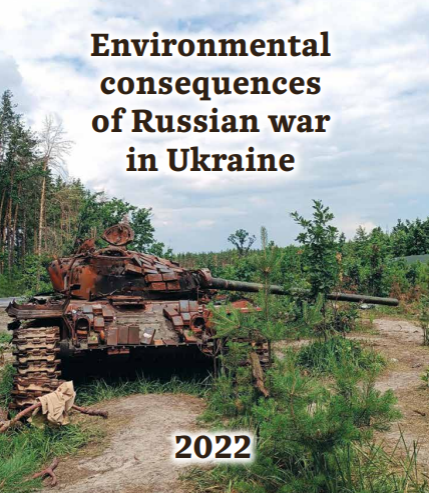
Download the presented analytical report War-damages-EN-VERSION
“The energy flow of the atomic bombing of Hiroshima has already exceeded the war in Ukraine, it can be compared to the same effect of nuclear bombs fall twice a month. Not only people and infrastructure have been affected, but also air, water, and soil. Fires, caused by the burning of forests and cities are a huge threat. But we will feel the worst impact on the environment in 10 years, when buildings and roads will be rebuilt, and industry will start,” says Miroslav Havránek, director of the Czech Environmental Information Agency. Thus, the reconstruction of 1 km of road leads to emissions of 65.78 tons of CO2. Construction of 1 sqm. buildings – 0.2-0.3 tons of CO2. He emphasizes that there will be a shortage of building materials, so it will be necessary to implement extensive recycling of materials.
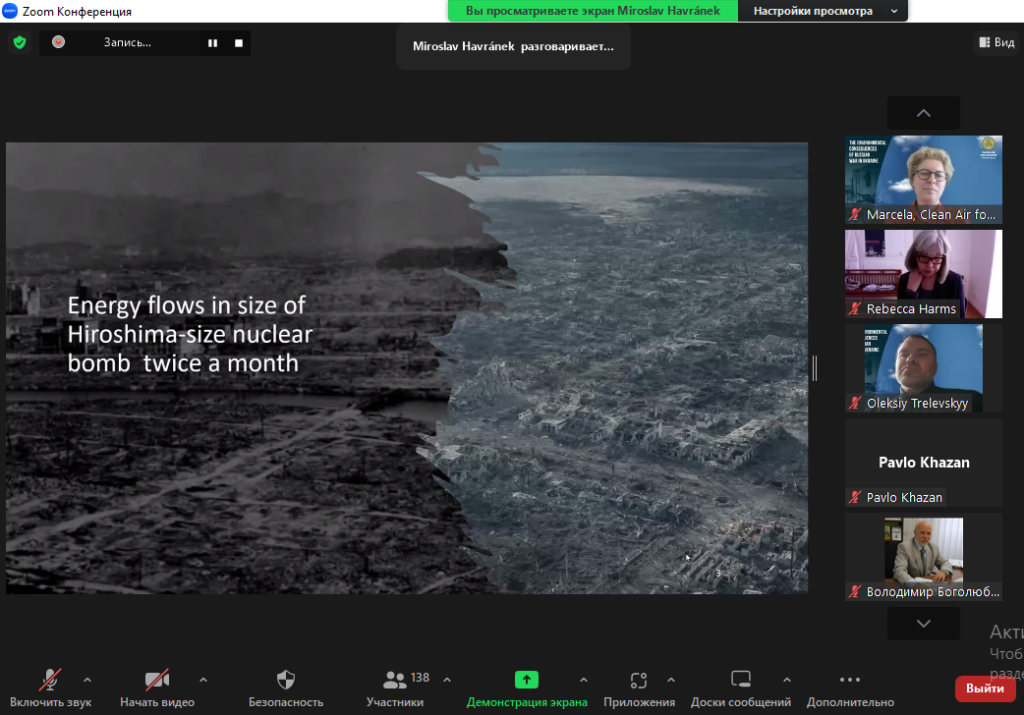
Download the presentation>> The war against Ukraine – the war against the environment: a view of the war from the Czech point of view Miroslav Havranek-War-vs-Environment
Rebecca Harms, a former member of the European Parliament from Germany, highlighted the environmental challenges to recovery in a report. “The post-war reconstruction of Ukraine must include all the damage caused to the environment. So, the EU makes a systematic review of the consequences of the war before starting the recovery. A comprehensive analysis of the damages that already exist and those that will appear during the construction process is required. It is necessary to analyze all problems and determine priorities, to develop a single method of post-war recovery,” said Harms.
Marcela Černochová, coordinator of the program “Clean Air for Ukraine”, NGO “Arnika”, spoke briefly about the work of the Program during the war and highlighted: new stations for monitoring chemical threats and radiation; a chatbot for alerting about dangerous air pollution and radiation background Radiation and Smog Alarm. And she disclosed the plans of the “Clean Air for Ukraine” program.
“We plan to conduct 4 studies of soil contamination by war in Dnipropetrovsk and Zaporizhzhia regions, using Czech experience and soil restoration methodology that can be helpful to Ukraine,” said Marcela.
“We see similarities between the Czech Republic and Ukraine. We were under the influence of the USSR and communism, we were fighting, we were freeing ourselves from Russian pressure. We had severe industrial pollution and economic recovery. And the Czech Republic was also on the way to joining the EU,” Černochová emphasized.
In the Czech Republic, a national inventory of contaminated lands was conducted, and these lands polluted by war and industrial pollution were restored.
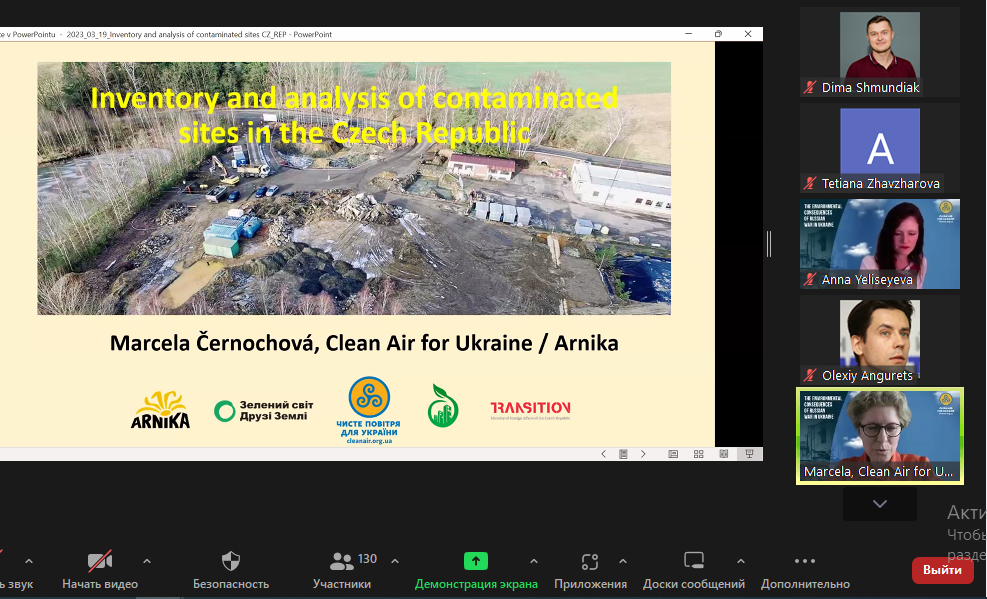
Download presentation>> Inventory and analysis of contaminated sites in the Czech Republic>> Marcela Cernochova-Inventory contaminated sites CZ
Maud Sarlieve from Pravo Justic presented an overview of the legal framework and norms that must be followed when gathering evidence of war crimes in the field of the environment.
An interesting study of the impact of war on air pollution in Ukraine using the example of NO2 nitrogen dioxide content based on satellite data was presented by Simona Bočková, “The World from Space”.
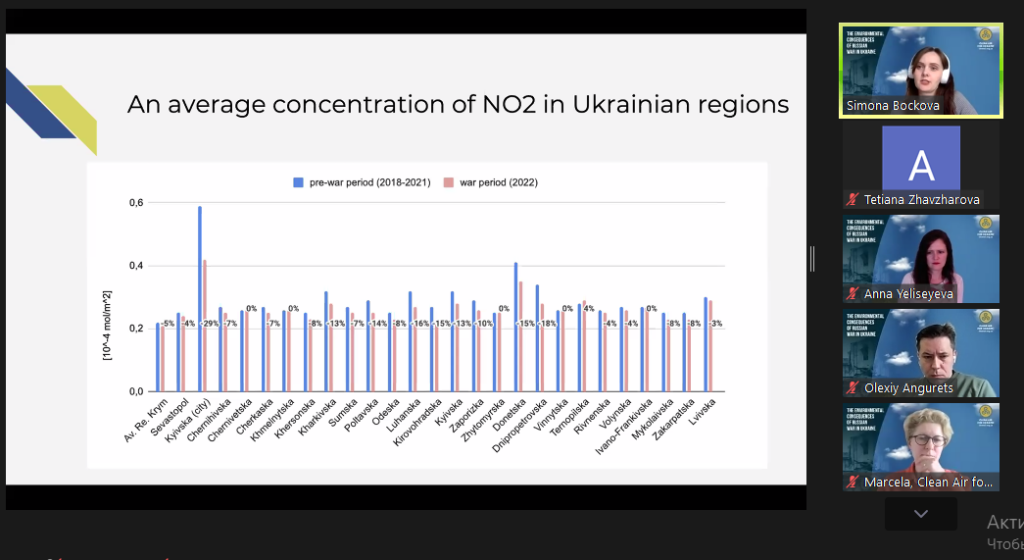
Download the presentation The effects of the war on air pollution in Ukraine – based on satellite data>> Simona Bockova-The effects of the war on air pollution in Ukraine
You can VIEW the RECORDING of the conference here>>
We invite you to follow announcements about future events of the international program “Clean Air for Ukraine” on our website and Facebook page.
The conference was organized by the Czech non-governmental organization “Arnika” as part of the “Clean Air for Ukraine” program, financed by the Ministry of Foreign Affairs of the Czech Republic as part of the Transition Program.
If you have questions or suggestions for the authors of the report, please, contact us by e-mail: office@cleanair.org.ua




